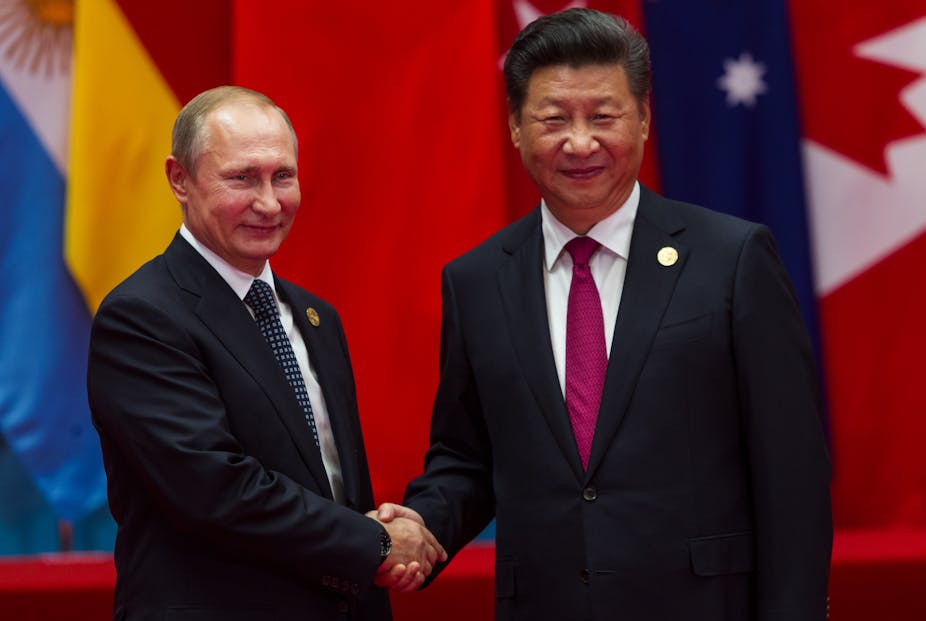Chinese President Xi Jinping visited Moscow to meet Russian President Vladimir Putin earlier this year, just a few days after the International Criminal Court released an arrest warrant against Putin for alleged war crimes in Ukraine.
Unfazed by the warrant, both state leaders emphasised the importance of the Russia-China relationship to form a multipolar world order and stop Western domination. “Multipolarity” has been seen as enabling an equal distribution of political, economic and military power and influence among several countries or centres of power.
Since Russia’s invasion of Ukraine, followed by Western sanctions against Russia, China has become an even more important economic partner for Russia, with two-way trade between them in 2022 reaching US$190 billion, up from US$147 billion in 2021 . China can also help Russia expand its influence elsewhere in Asia.
Dynamic region
Russia formally views Asia as a dynamic region with great economic and demographic power. The fact that large countries in Asia such as China, India, and Indonesia did not impose sanctions against Russia nor reduce cooperation with it after Ukraine war indicates how independent the region has become from Western influence – and that has increased Asia’s value for Russia.
Some in Asia see Russia as an alternative in the middle of US-China power competition in the region. Although its influence has yet to be as strong as the US and China, Russia could provide numerous opportunities for some Asian states. Among them are defence cooperation through arms exports and joint military exercises with Asian countries, and energy cooperation. Increasing Russia’s oil and gas exports to Asia is an example of the latter.
Russia already has a number of energy projects in Asia, such as oil refineries in Indonesia and Vietnam, and the construction of nuclear power plants in China, India and Bangladesh.
Russia has also actively participated in various Asian forums, such as the East Asia Summit (EAS), ASEAN Regional Forum (ARF) and ASEAN Defence Ministers Meeting Plus (ADMM+). It has routinely developed aspects of security cooperation, such as counterterrorism and cyber security.
Things in common
Historically, the current close relations between Russia and China are a consequence of both countries’ diplomatic reconciliation since the end of the Cold War. In 1996, the then Russian President Boris Yeltsin and Chinese President Jiang Zemin signed a “strategic partnership for a multipolar world” and this line has been continued by their successors.
More recently, Russia and China have been critical of the promotion of Western liberal democracy, which they see as a threat to their systems. The two powers are actively developing relations with the other parts of the world, such as Africa and Latin America, in order to build an alternative to challenge Western hegemony, promoting themselves as “an interesting model” in comparison to the West.
Both Russia and China cite their respective cultures, traditions and histories as bases for their patriotic values. Therefore, they say they always uphold “respect towards cultural heritage and diversity of every country” as part of their principles in foreign policies.
China’s role
In Russia’s pivot to Asia strategy, China plays an important role as a political, economic and diplomatic power in the region. Not only is China one of Russia’s largest markets for military arms but it has become a huge consumer of Russia’s oil and gas products, thanks in large part to the Siberia pipeline
Russia has also linked some international integration projects with China. The Brazil, Russia, India, China and South Africa bloc (BRICs), the Eurasian Economic Union (EAEU), Shanghai Cooperation Organisation (SCO) and Association of Southeast Asian Nations (ASEAN) are all seen as having a part to play in the Russian concept of a Greater Eurasian Partnership.
Given the challenges both countries face, and their scale in terms of geography and population, the Russia-China relationship is of huge international significance. And it is becoming of increasing importance to other Asian countries.


